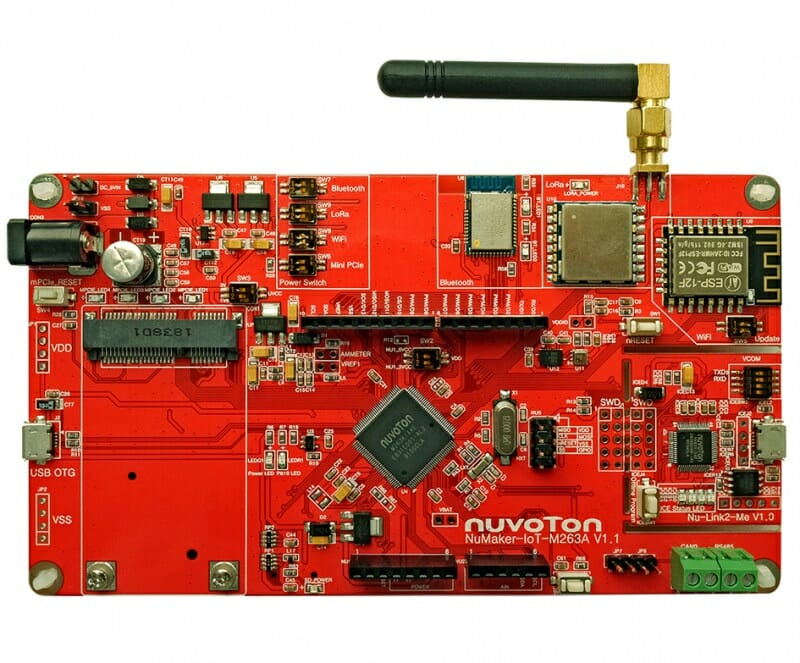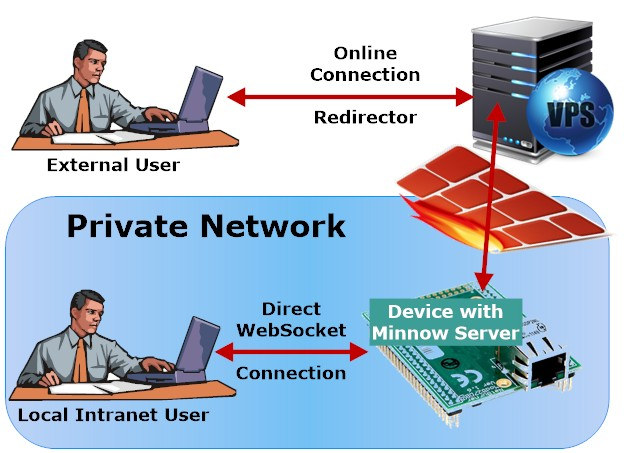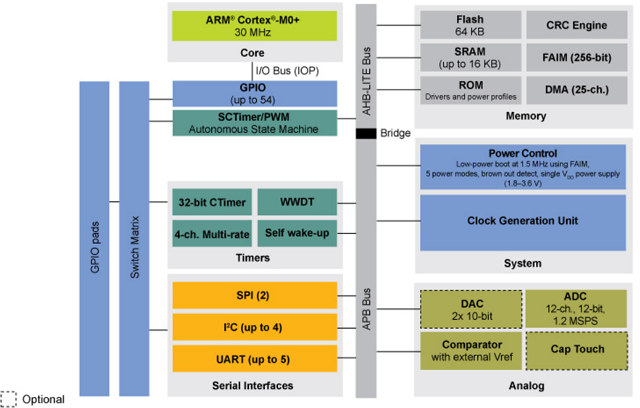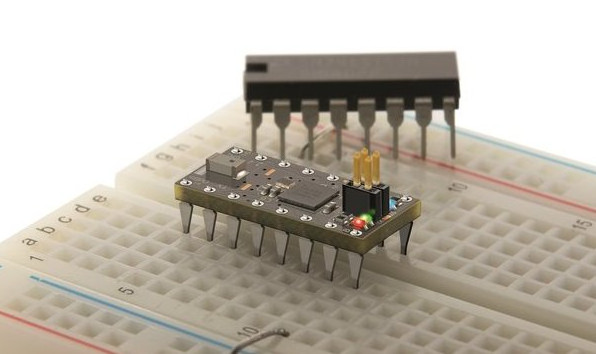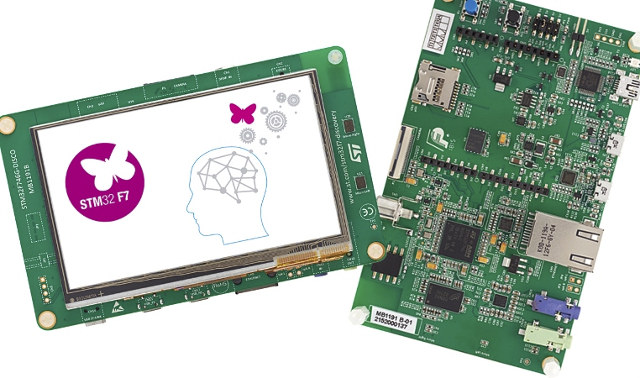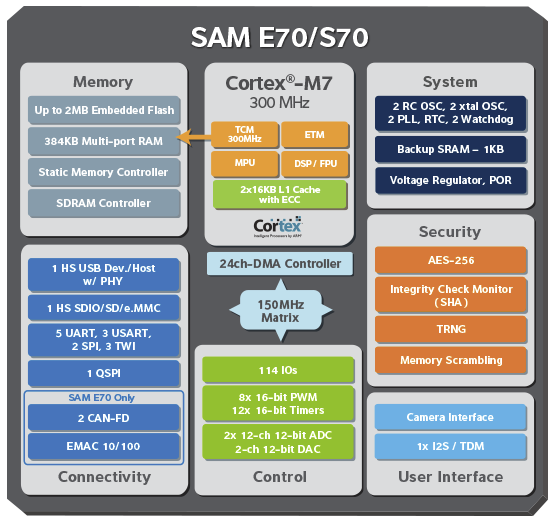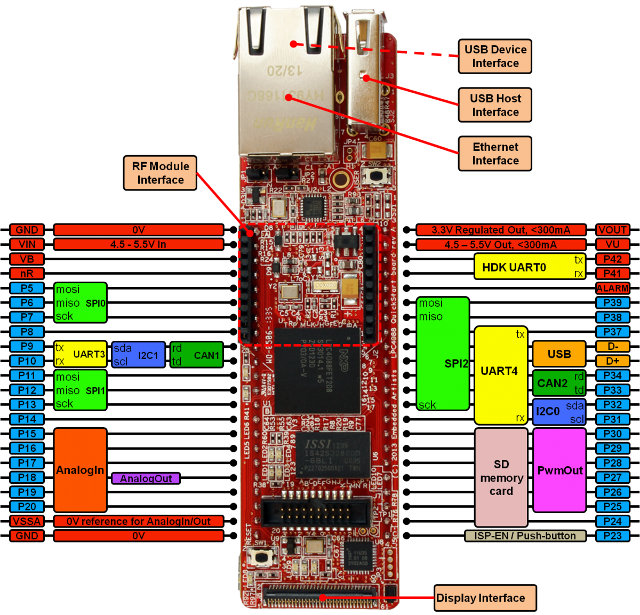If you’d like an MCU board to experiment with various wireless (and wired) protocols used for Internet of Things applications, the Nuvoton NuMaker-IoT-M263A development board may be worth a look. Powered by a NuMicro M263KIAAE Arm Cortex-M23 CPU microcontroller, the board offers WiFi, Bluetooth, and LoRa connectivity, plus an mPCIe socket for 3G, 4G, or NB-IoT cellular connectivity. It also comes with various sensors, as well as CAN and RS485 transceivers for industrial control applications. NuMaker-IoT-M263A key features and specifications: MCU – Novoton NuMicro M263KIAAE Arm Cortex-M23 microcontroller @ 64 MHz with 96KB SRAM, 512 KB dual-bank flash for OTA upgrade, 4 KB LDROM; LQFP128 package Storage – MicroSD card connector On-board wireless modules ESP12-F (ESP8266) 802.11b/g/n module MDBT42Q-PAT Bluetooth 4.2/5.0 LE module APC1278 (for 408 / 433 / 470 MHz) LoRa module plus antenna Serial – CAN and RS485 transceiver USB – 1x Micro USB OTG connector (to M263 […]
Minnow Server is a Secure Web Server for Microcontrollers
Many embedded systems have a limited amount of memory, which would normally run programs with smaller footprints than on desktops or servers. For example, nginx and Apache2 are the common web servers, but on hardware with limited memory, smaller footprint web servers may be required, so that’s why I wrote a list of web servers for embedded systems running Linux/uClinux many years ago. But now, even platforms based on microcontrollers often need to run web server usually for configuration. We’ve already shown how to use Arduino to serve a simple web page and did the same in Getting Started with NodeMCU Board Powered by ESP8266 WiSoC but using Lua programming language instead. It may be more convenient to run a proper web server however, as it’s easier to change the interface, and we previously covered MicroWebSrv lightweight web server that works on platforms running MicroPython such as Pycom boards. Real Time […]
RAK8211-NB iTracker Battery / Solar Powered Module Comes with NB-IoT & Bluetooth 5 Connectivity, GPS, and 5 Sensors
Rak Wireless has recently launched a new products called RAK8211-NB iTracker based on a Quectel BC95-G NB-IoT module, Nordic Semi nRF52832 Bluetooth 5 chip, and Quectel L70-R GNSS module. The asset tracker module also comes with 5 different sensors to monitor motion and environmental data, and can optionally be powered directly by a solar panel.RAK8211-NB iTracker specifications: Connectivity NB-IoT via Quectel BC95-G (Global) wireless communication module + SIM card socket Bluetooth 5 via Nordic Semi nRF52832 Arm Cortex-M4F micro-controller (Arduino compatible) GPS/GLONASS via Quectel L70 GNSS module Sensors LIS3DH 3-axis “nano” accelerometer LIS2MDL 3-axis digital magnetic sensor. Tilt sensor BME280 pressure, humidity and temperature sensor OPT3001 intensity of light sensor Expansion – 3x headers with SWD, 2x sensor out + tilt out (also usable as GPIO and analog inputs), 3.3V, GND, and reset Power Supply – 3.5V to 18V via solar panel (P2) or battery (P3) Dimensions – 43mm x […]
NXP Unveils LPC84x ARM Cortex M0+ MCU Family, and LPCXpresso845-MAX Evaluation Board
NXP Semiconductors has expanded LPC800 series MCUs with the new LPC84x family of 32-bit ARM Cortex-M0+ microcontroller said to offer 10 times the performance, three times more power saving savings, and 50 percent smaller code-size than 8- or 16-bit microcontrollers. Key features of LPC84x MCU family (LPC844 / LPC845): MCU Core – ARM Cortex-M0+ core @ 30 MHz with advanced power optimization RAM – 16 kB RAM (Logic for Bit banding across all of SRAM) Storage – 64 kB Flash, small 64-byte page size suitable for EEPROM emulation Peripherals Timers – 32-bit CTimer, WWDT, 4-channel multi-rate, SCTimer/PWM Serial Interfaces – Up to 4x I2C, 2x SPI, up to 5x UART Analog Interfaces – 12 ch, 12-bit ADC up to 1.2 Msps; 2x 10-bit DAC; comparator with external Vreg; 9-channel capacitive touch interface working in sleep and deep sleep modes Up to 54 GPIOs 25-ch DMA offloads core Power Control Five […]
OSHCHIP Breadboard Friendly Bluetooth Smart Board Comes in a Tiny 16-pin DIP Package
OSHCHIP is a tiny development board powered by a Nordic Semi ARM Cortex-M0 Bluetooth LE / ANT SoC that neatly fits on a breadboard, and beside wireless connectivity thanks to its 2.4 GHz radio, also provides up to 14 I/Os to interface with external hardware. OSHCHIP specifications: Nordic Semi nRF51822 ARM Cortex-M0 MCU @ 16 MHz with 256KB Flash Memory, 32KB SRAM Radio – 2.4 GHz Radio with support for 4 protocols: Bluetooth Low Energy (BLE) / Bluetooth Smart, Gazell, ESB (Enhanced Shock Burst), and optionally ANT Antenna – Built-in antenna, range is 10 to 20 feet, depending on environment (metal, desks, chairs, …) Expansion – 14 general purpose I/O pins. All peripherals (except the ADC) can use any I/O pin: UART, 10-bit ADC, Counter/Timers, SPI, I2C Security – AES Encryption, Random Number Generator. Misc – Temperature sensor, RTC, Watchdog Timer Quadrature Decoder, 3 LEDs, Power Supply – 1.8V to 3.6V […]
STM32F746G-DISCO is a $49 Cortex-M7 Board with a 4.3″ LCD Display, Arduino Headers
We’ve already seen Atmel started shipping its SAM V71 Xplained Board based on its latest Cortex M7 a few days ago, but Atmel is not the company which recently introduced a Cortex M7 development kit, as ST Micro also launched an STM32F7 Cortex M7 development kit with Arduino headers and 4.3″ LCD at the end of June. The “Discovery Kit with STM32F746NG MCU” (STM32F746G-DISCO) comes with the following specifications: MCU – STMicro STM32F746NGH6 Cortex M7 MCU with 1 MB Flash, 340 KB RAM, in BGA216 package Memory – 128-Mbit (16 MB) SDRAM (64 Mbits accessible) Storage – 16 MB Quad-SPI Flash memory, and micro SD slot Display – 4.3″ 480×272 color LCD-TFT with capacitive touch screen Camera – Camera connector Connectivity – Ethernet connector compliant with IEEE-802.3-2002 USB USB OTG HS with Micro-AB connectors, USB OTG FS with Micro-AB connectors USB functions: virtual COM port, mass storage, debug port Audio […]
Atmel SAM S70 and SAM E70 Cortex M7 MCUs, SAM V71 Xplained Board Are Now Shipping
ARM Introduced Cortex M7 IP in September, and ST Micro simultaneously announced its STM32F7 Cortex M7 MCU clocked up to 200 MHz, and boards are now available, including some running Linux. But two other companies have licenses Cortex M7, Freescale with its Kinetis KV5x micro-controllers which are yet to be mass-produced, and Atmel which has recently announced their SAM S70 and E70 micro-controllers are now in mass production. SAM E70 and S70 have similar features, but E70 offers some extra interface like CAN and Fast Ethernet: ARM Cortex-M7 core running at up to 300MHz (1500 CoreMark) Up to 2MB Flash and 384kByte SRAM Floating point unit (FPU) for high-precision computing and accelerated data processing High-performance internal memory architecture with user configurable Tightly Couples Memories and System memory, and 16kB I and D-cache High Speed USB Host and Device with on-chip high-speed PHY CMOS image sensor interface AES hardware encryption engines, […]
ARM Unveils Embedded Systems Education Kit Based on NXP LPC4088 Cortex M4 MCU
Following up on their first “Lab-In-a-Box” initiative based on Micro STM32F4-Discovery board and Wolfson audio card, ARM launched another low-cost toolkit, based on Embedded Artists LPC4088 QuickStart and Experiment boards, and called “Embedded Systems Education Kit”, to help university educators teach embedded systems design and programming concepts. The kit includes the following hardware, software tools, and teaching materials: Embedded Artists LPC4088 QuickStart Board and LPC4088 Experiment Base Board ARM Keil MDK-ARM Pro microcontroller development suite software licences Complete teaching materials including lecture note slides, demonstration code and hands-on lab manuals with solutions in source for four embedded system courses: ‘Efficient embedded systems design and programming’ teaches microcontroller fundamentals using NXP’s 32-bit ARM Cortex-M4 based LPC4088 microcontroller. ‘Rapid embedded system design and programming’ delivers embedded systems design training for the high-level ARM mbed API ‘OS design’ uses the royalty-free ARM Keil RTX RTOS to show how to design, program and optimize […]


